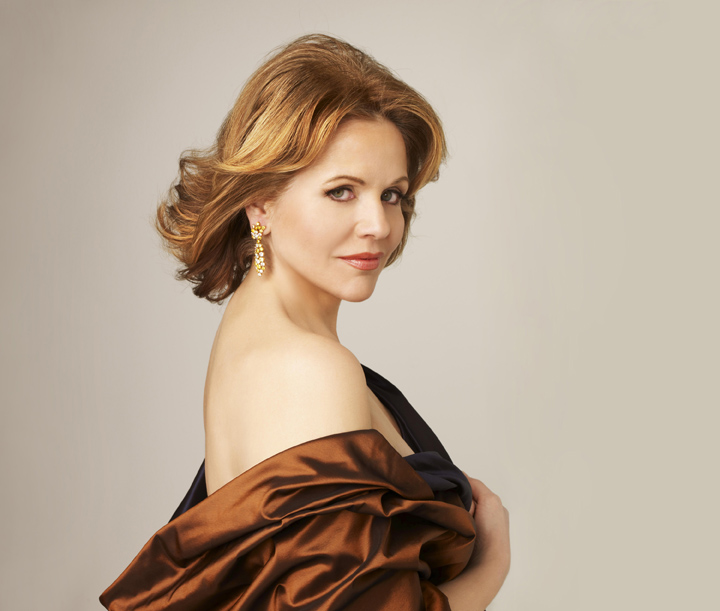
Loving the light
In her introduction, Renee Fleming, elegantly gowned in turquoise green on the stage of Cal Performances’ Zellerbach Hall last Sunday, remarked that now seemed to be the time for Olivier Messiaen’s song cycle Poèmes pour Mi. Written in 1936 for his wife, the violinist and composer Claire Delbos, the cycle mixes his passionate love for his human spouse and his divine God.
Fleming’s comment was not about the work’s religious tone but about its subtler acoustic qualities and her recognition that musical taste is defined by cultural milieu as much as by genius.
The statement reveals Fleming’s most salient features as a performer: her intelligence and her humility in the face of musical beauty. She combines these traits with a voice of pure high notes warmed by richer overtones, which allows her to take on a wide range of vocal colors in her interpretation of a song’s emotional undercurrents. Vocal beauty and technique are simply the tools for her complex and finely tuned artistry.
What Fleming loves about Poèmes is the music’s sense of “light,” which permeates the songs and becomes a presence, like the birds in many of Messiaen’s compositions. This love of light—meaning openness and lucidity rather than lack of weight—characterized the recital’s first half, which comprised works by French composers spanning the 20th century: Messiaen, Jules Massenet, in the first decade, and Henri Dutilleux, who can now claim to be a 21st-century composer at the age of 94.
These composers focus on a spectrum of vocal techniques; some close to speech, some to vocalise, all with subtle shifts in pace, harmonics and dynamics. Messiaen’s “Ta voix” (Your voice) moves with intense momentum from notes of icy purity to ones of spring warmth, and the gentle rocking motion of “Le collier” (The necklace) runs through vocalise to pianissimo passages of sweetness and contemplation: “Ah, my necklace! Ah, my necklace!/ Your two arms around my neck this morning.”
Even Massenet’s “J’ai versé le poison dans cette coup d’or” (I’ve poured the poison into this golden cup) plays with detachment and cruel wit as Cleopatra offers poison to her slaves in exchange for one of her kisses: “Is there one among you who / Loves me and desires me enough to wish to be carried away by a caress?” Fleming ends the aria with a long sustained pianissimo note—“my most tender kiss”—that shifts exquisitely into mezzo forte and then falls back to pianissimo.
Fleming concluded the first half of the concert with a song cycle written for her by Dutilleux. She claims to have courted him for several years—“I used every wile I could”—and at last he rewarded her with a four-song cycle, set in a complex harmonic style with references to jazz. Fleming hears Bill Evans in some of the music.
Among this French composer’s strengths is “his impeccable taste in poetry.” And, truly, all the poems in this cycle are excellent, but none quite so moving and refined in its distillation as the “Dernière poème” (Last poem) by Robert Desnos, which was found on his body at Terezín concentration camp, where he died of typhoid two weeks after its liberation. “I’m left to be the shadow among shadows … / To be the shadow that will appear and reappear / in your sun-filled life.”
It’s also clear why Fleming, as a singer, is drawn to Dutilleux; his songs are precisely set to her voice. In “Le masque” (The mask), rocking through jazz rhythms, her voice took a sudden vault into a shivery passage in the upper range, later dropping down to something close to speech; Dutilleux set the word cristaux (crystals) in the last line—“brillants cristaux nocturnes de l’été” (brilliant nocturnal crystals of summer)—on the purest note in Fleming’s range. Fleming’s delight in the songs was obvious.
After intermission, Fleming returned to the stage in a new dress and a new mindset. This was the emotionally dramatic half of the program, beginning with five Richard Strauss songs: “Verführing,” “Freundliche Vision,” “Ständchen,” “Winterweihe” and “Zueignung.”
Strauss is Fleming’s territory. She sings him with authority, transforming the music’s lush emotionalism and flickering sensuality with deep understanding. Over the years, and perhaps because of the years, she has learned to modulate the colors in her voice to shift throughout the text, bringing as much subtlety as she can to the songs’ overheated romanticism. These subtleties would not be possible without the facility—the ease—that is the foundation of Fleming’s singing.
The remainder of the program was late-19th-century verismo arias, spanning emotions from coquetry to disillusion and all with a strong melodic line, allowing Fleming to expand in effortless expression.
All in all, a lovely concert by one of our loveliest singers.
—Jaime Robles
Originally published in the Piedmont Post
Photo: Andrew Eccles
